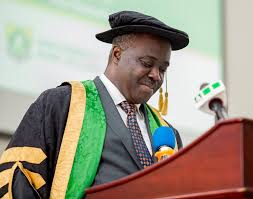The Vice Chancellor of the University of Health and Allied Sciences, Professor John Owusu Gyapong, says the government’s decision to wean public universities off its payroll was first suggested by the University Teachers Association of Ghana (UTAG).
According to him, UTAG is hoping that such an initiative would help address the fiscal challenges public universities and lecturers face while performing their duties.
As put by the University of Ghana’s UTAG Secretary, Ransford Gyampo, in an earlier interview, weaning public universities off state funds, would allow these institutions charge appropriate fees in order to be run effectively and efficiently.
He had said, “Some of the proceeds can be used to pay lecturers or beef up the infrastructure of these various universities, rather than always waiting for government subvention that delays and government subvention that are woefully inadequate that are not able to do anything for the university and for expanding their infrastructure.”
Speaking on PM Express, Prof Gyapong noted that the suggestion which was made by UTAG was an attempt to address the poor conditions of service which had culminated into their strike action.
“This suggestion came from the UTAG side, that a better management system is giving the university the grants that it requires to be able to run the university. So I guess in the expectation of UTAG, if for instance government is giving us 5 million cedis for salaries every month, then over the year it will be about 60 million.
“So government will give the university the 60million and say you manage it and don’t come to me. I conjecture that that was the expectation. So it is not to say that government was going to take away all the funds that it gives to the universities.
“Of course in that discussion it became clear that it wasn’t going to be the total 100% that will come to the university but as to what proportion will come, nobody discussed that. I mean the subject was broached, it wasn’t discussed in detail.”
The Finance Minister, Ken Ofori-Atta is yet to release the full details of how the government intends to wean off the tertiary institutions, and how the block grant will be administered.
Meanwhile, the Minority have expressed their opposition to the suggestion.
A Deputy Ranking Member of Parliament’s Education Committee says that the proposal to wean public tertiary institutions off government payroll “will invariably restrict access to tertiary education.”
Dr Clement Apaak says implementing the proposal will create a financial barrier, which would add to the existing infrastructure challenges and “prevent the poor and marginalised from accessing tertiary education.”
Latest Stories
-
NPP to open 2028 flagbearer nominations on July 29
1 hour -
NDC opens nominations for Akwatia parliamentary primaries on July 28
2 hours -
Guinness Ghana DJ Awards opened new doors for my career – DJ Pho
3 hours -
Mohammed Sukparu commits to advancing Ghana’s Artificial Intelligence agenda
3 hours -
‘What is coding?’ – Question raises eyebrows during Deputy Communication Minister-nominee’s hearing
3 hours -
WAFCON 2024: Ghana’s Black Queens claim third-place after penalty win over South Africa
3 hours -
Ghana celebrates 100-year-old WWII veteran Joseph Ashitey Hammond
4 hours -
Measures announced in Mid-Year Budget Review fully in line with programme objectives – IMF
4 hours -
This Saturday on Newsfile: AG drops charges in uniBank trial, Aud-General’s report, and Mid-Year Budget Review
4 hours -
Parliament passes Road Maintenance Trust Fund Bill
5 hours -
Heavy security deployed at Manhyia Palace following Asawase shootings
5 hours -
Kumawu MP Ernest Anim urges Parliament to act on crisis in Ghana’s prisons
5 hours -
Kumawu MP decries ‘Inhumane’ feeding rate in Ghana’s prisons
6 hours -
Mahama appeals for calm in Nkwanta, condemns recent killings
7 hours -
Ghana Career and Migration Fair 2025 launched to prepare youth for the future of work
7 hours

